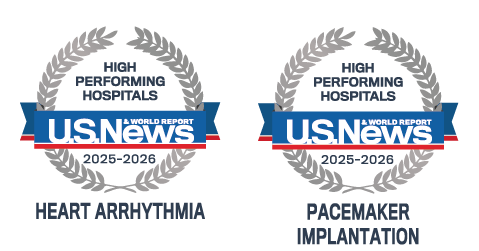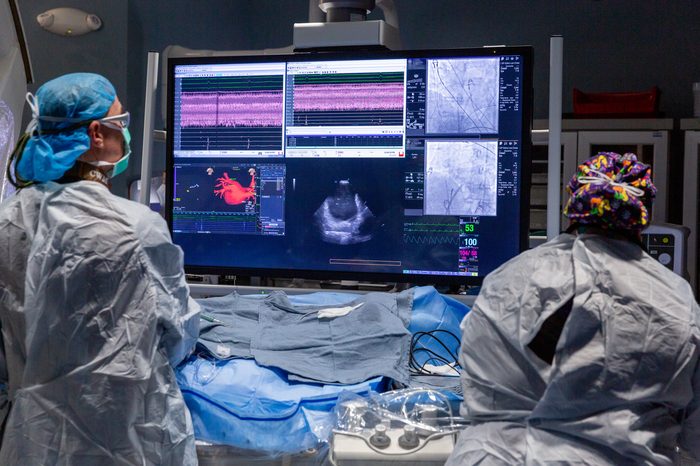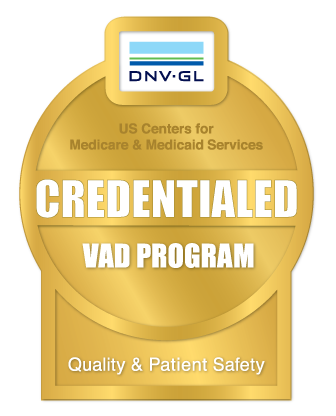Heart Rhythm Conditions
Heart Rhythm Conditions
Heart Rhythm Conditions
Arrhythmias can make your heart beat faster than it should or slower than normal. Your heart can also feel like it is "skipping" a beat.
Arrhythmias can feel scary, but we have excellent ways to treat them, including medicines and procedures. We treat many of these conditions in our electrophysiology lab, one of the biggest in the region.
Arrhythmias can make your heart beat faster than it should or slower than normal. Your heart can also feel like it is "skipping" a beat.
Arrhythmias can feel scary, but we have excellent ways to treat them, including medicines and procedures. We treat many of these conditions in our electrophysiology lab, one of the biggest in the region.

Your heart muscles pump blood. Your heart relies on a complicated electrical system to make the muscles squeeze.
An arrhythmia, or irregular heartbeat, is a problem with that electrical system. Atrial fibrillation (A-fib) is the most common type of arrhythmia.
Your heart slows when you're at rest and speeds up when you exercise. But with an arrhythmia, your heart beats faster or slower, not tied to your activity level. You might also have a fluttery feeling in your chest.
Ultimately, an arrhythmia can affect how much blood your heart is pumping. It can make you feel dizzy or faint. Untreated arrhythmias can also lead to a stroke or more serious heart problems.
The type of cardiologist who treats heart rhythm problems is called an electrophysiologist. Electrophysiologists can do a range of procedures to treat arrhythmias.
What Is an Arrhythmia?
Your heart muscles pump blood. Your heart relies on a complicated electrical system to make the muscles squeeze.
An arrhythmia, or irregular heartbeat, is a problem with that electrical system. Atrial fibrillation (A-fib) is the most common type of arrhythmia.
Your heart slows when you're at rest and speeds up when you exercise. But with an arrhythmia, your heart beats faster or slower, not tied to your activity level. You might also have a fluttery feeling in your chest.
Ultimately, an arrhythmia can affect how much blood your heart is pumping. It can make you feel dizzy or faint. Untreated arrhythmias can also lead to a stroke or more serious heart problems.
The type of cardiologist who treats heart rhythm problems is called an electrophysiologist. Electrophysiologists can do a range of procedures to treat arrhythmias.
At Carilion Clinic, we treat all types of irregular heartbeats.
This includes heartbeats that:
- Are too slow (bradycardia)
- Are too fast (tachycardia)
- Have a premature or "extra" beat
We categorize arrhythmias according to whether they start in the upper part of the heart or the lower part.
Types of supraventricular arrhythmias
These are arrhythmias that start in the upper part of the heart. They are the most common type of arrhythmias.
They include:
- Atrial fibrillation (A-fib): Your heart's upper chambers beat unevenly, and the lower chambers don't fill with blood as they should. A-fib can lead to problems like blood clots and stroke.
- Atrial flutter: Your heart's upper chambers beat too fast, often at a different rate than the lower chambers. Atrial flutter is not the same as atrial fibrillation — A-fib has a more irregular rhythm.
- Supraventricular tachycardia: A fast heart rate that starts and stops suddenly. It can happen during exercise and often isn't dangerous (but you should always check with a doctor).
Types of ventricular arrhythmias
Ventricular arrhythmias start in your heart's lower chambers (ventricles).
They include:
- Ventricular tachycardia: A fast heartbeat that may last a few seconds or longer. It can be serious if it happens a lot because it can lead to V-fib.
- Ventricular fibrillation (V-fib): This is a potentially life-threatening condition when your ventricles quiver instead of pumping. If they can't pump blood, it can lead to cardiac arrest.
Other heart rhythm conditions
There are other, less common heart rhythm conditions. At Carilion, we know how to care for people with rare heart rhythm problems.
This includes long QT syndrome, a rare, often inherited condition. It happens when the electrical signals in the heart take too long to reset after each heartbeat. It can lead to dangerous heart rhythms.
Sick sinus syndrome is another rare heart rhythm disorder. It happens when your heart's natural pacemaker doesn't work as it should. Your heart can beat too fast or too slowly.
What causes arrhythmias?
Doctors don't always know what causes irregular heart rhythms. Children can be born with them (our pediatric heart team treats these). But many develop later in life.
Things we know are linked to arrhythmias include:
- Age: Older adults are more likely to have arrhythmias, especially if they have other health issues like high blood pressure or heart disease.
- Genetics: Heart rhythm problems sometimes run in families.
- Smoking: Smoking is linked to heart disease in general.
- Medicine: Some medicines might raise your risk for arrhythmia.
Types of Arrhythmias
At Carilion Clinic, we treat all types of irregular heartbeats.
This includes heartbeats that:
- Are too slow (bradycardia)
- Are too fast (tachycardia)
- Have a premature or "extra" beat
We categorize arrhythmias according to whether they start in the upper part of the heart or the lower part.
Types of supraventricular arrhythmias
These are arrhythmias that start in the upper part of the heart. They are the most common type of arrhythmias.
They include:
- Atrial fibrillation (A-fib): Your heart's upper chambers beat unevenly, and the lower chambers don't fill with blood as they should. A-fib can lead to problems like blood clots and stroke.
- Atrial flutter: Your heart's upper chambers beat too fast, often at a different rate than the lower chambers. Atrial flutter is not the same as atrial fibrillation — A-fib has a more irregular rhythm.
- Supraventricular tachycardia: A fast heart rate that starts and stops suddenly. It can happen during exercise and often isn't dangerous (but you should always check with a doctor).
Types of ventricular arrhythmias
Ventricular arrhythmias start in your heart's lower chambers (ventricles).
They include:
- Ventricular tachycardia: A fast heartbeat that may last a few seconds or longer. It can be serious if it happens a lot because it can lead to V-fib.
- Ventricular fibrillation (V-fib): This is a potentially life-threatening condition when your ventricles quiver instead of pumping. If they can't pump blood, it can lead to cardiac arrest.
Other heart rhythm conditions
There are other, less common heart rhythm conditions. At Carilion, we know how to care for people with rare heart rhythm problems.
This includes long QT syndrome, a rare, often inherited condition. It happens when the electrical signals in the heart take too long to reset after each heartbeat. It can lead to dangerous heart rhythms.
Sick sinus syndrome is another rare heart rhythm disorder. It happens when your heart's natural pacemaker doesn't work as it should. Your heart can beat too fast or too slowly.
What causes arrhythmias?
Doctors don't always know what causes irregular heart rhythms. Children can be born with them (our pediatric heart team treats these). But many develop later in life.
Things we know are linked to arrhythmias include:
- Age: Older adults are more likely to have arrhythmias, especially if they have other health issues like high blood pressure or heart disease.
- Genetics: Heart rhythm problems sometimes run in families.
- Smoking: Smoking is linked to heart disease in general.
- Medicine: Some medicines might raise your risk for arrhythmia.
If your primary care doctor notices an abnormal heart rhythm, they'll send you to an electrophysiologist. An electrophysiologist is a cardiologist who is an expert in the heart's electrical system. They'll examine you, ask about symptoms and do imaging and other diagnostic tests.
Because arrhythmias range from very mild to life-threatening, your treatment depends on your diagnosis, risk factors and symptoms.
It may include:
- Lifestyle changes: Things like quitting smoking and lowering blood pressure can reduce the risk of making your arrhythmia worse.
- Medicine: You may need drugs to treat a slow, fast or irregular heart rhythm. These can include beta-blockers, calcium channel blockers, adenosine and other drugs.
- Monitoring: Your doctor may have you wear a particular heart rate monitor that reports your heart rhythms.
- Cardioversion: This procedure can restore a normal heart rhythm in people with certain arrhythmias. Sometimes, we do cardioversion with medicine, but usually, we do it by sending electric shocks through electrodes on your chest.
- Ablation: Ablation uses heat to "burn" the heart tissue causing the irregular heartbeat. We can also do ablation with a "cryoballoon" that uses freezing energy instead of heat. We do these procedures through cardiac catheterization.
- Implanting devices: Some people may need heart devices to help control their heart rhythm. This includes implantable cardioverter defibrillators, which can shock your heart to restore a normal rhythm. It also includes pacemakers, which help your heart keep a steady rhythm.
How We Treat Rhythm Conditions
If your primary care doctor notices an abnormal heart rhythm, they'll send you to an electrophysiologist. An electrophysiologist is a cardiologist who is an expert in the heart's electrical system. They'll examine you, ask about symptoms and do imaging and other diagnostic tests.
Because arrhythmias range from very mild to life-threatening, your treatment depends on your diagnosis, risk factors and symptoms.
It may include:
- Lifestyle changes: Things like quitting smoking and lowering blood pressure can reduce the risk of making your arrhythmia worse.
- Medicine: You may need drugs to treat a slow, fast or irregular heart rhythm. These can include beta-blockers, calcium channel blockers, adenosine and other drugs.
- Monitoring: Your doctor may have you wear a particular heart rate monitor that reports your heart rhythms.
- Cardioversion: This procedure can restore a normal heart rhythm in people with certain arrhythmias. Sometimes, we do cardioversion with medicine, but usually, we do it by sending electric shocks through electrodes on your chest.
- Ablation: Ablation uses heat to "burn" the heart tissue causing the irregular heartbeat. We can also do ablation with a "cryoballoon" that uses freezing energy instead of heat. We do these procedures through cardiac catheterization.
- Implanting devices: Some people may need heart devices to help control their heart rhythm. This includes implantable cardioverter defibrillators, which can shock your heart to restore a normal rhythm. It also includes pacemakers, which help your heart keep a steady rhythm.
Not only do we offer routine heart care in your neighborhood, but we're also a destination for many specialty surgeries. Carilion offers programs and heart treatments that are unique in our region, drawing people from across Virginia and neighboring states.

Award-winning care
Rated “high performing” in heart arrhythmia care and pacemaker implantation by U.S. News & World Report, Carilion Roanoke Memorial Hospital helps patients manage symptoms and improve quality of life with expert treatment.

Large electrophysiology program
With 30+ cardiologists and 30+ locations, our cardiology team is one of the largest in the region. We do more than 1,400 heart rhythm procedures each year. We've recently upgraded the technology in our electrophysiology lab.

Destination for the latest heart failure treatments
Ventricular assist devices (VAD) are heart pumps that save or extend the life of people with heart failure. As the only VAD Center of Excellence in Western Virginia, we have the highest level of training in using VAD.
Why Choose Carilion Clinic?
Not only do we offer routine heart care in your neighborhood, but we're also a destination for many specialty surgeries. Carilion offers programs and heart treatments that are unique in our region, drawing people from across Virginia and neighboring states.
Health and Wellness

Arrhythmia: All About Abnormal Heart Rhythms

Mental Health and Your Heart

Air Fryer Crispy (Un) Fried Chicken
Get Care at Carilion Clinic
Your path to better health starts here. Explore comprehensive care options and find the support you need for every step of your wellness journey.
Get Care at Carilion Clinic
Your path to better health starts here. Explore comprehensive care options and find the support you need for every step of your wellness journey.
Get Care at Carilion Clinic
Your path to better health starts here. Explore comprehensive care options and find the support you need for every step of your wellness journey.
Get Care at Carilion Clinic
Your path to better health starts here. Explore comprehensive care options and find the support you need for every step of your wellness journey.
